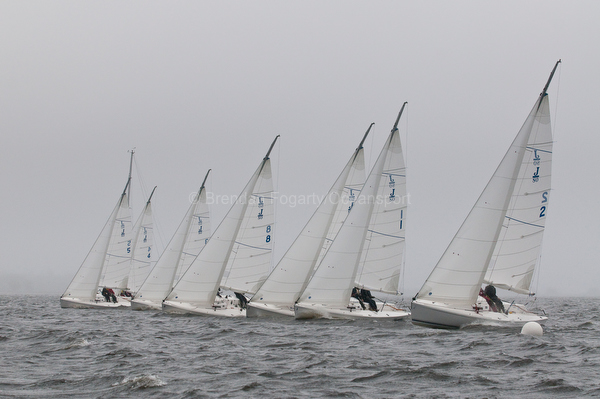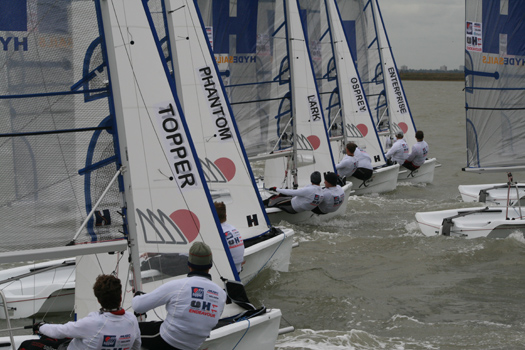Displaying items by tag: Trevor
Nice to be Invited to the All Ireland Sailing Championships
Wayfarer Dinghy National Champion Trevor Fisher was not invited to sail in last weekend's Waterway's Ireland ISA All Ireland Sailing Championships. Here he outlines why and suggests the system for participation in 'Ireland's most prestigious sailing event' needs an overhaul. (First published: 12th October 2011)
For many people, the opportunity to sail in an event such as the 'Waterways Ireland All Ireland Sailing Championships' would be welcome, for some it would be the highlight of the summer sailing season. Why would it not be welcome? You have the chance to sail against some of the best sailors in the country, Olympic competitors, sailors who race week in, week out and work hard to promote their classes and develop sailing on the island. How does that opportunity come about? Previous winners include some of the best dinghy sailors that Ireland has produced, and without doubt, all winners of the event have been worthy champions.
In years gone by, participation in the event appeared to be straightforward – you won your class national championships and were invited by the ISA. In recent years, the event seems to have changed. It is now appears to be predominantly sailed for by keelboat sailors and the nomination / invitation process is unclear. Classes with 4 Irish based boats at their national championships were invited and represented, but other classes with higher attendance figures were not invited (but were nominated). This year, 2 of the 16 invitees won their dinghy classes national championships and were invited - many dinghy class national champions were not invited to take part. Invitees included the 3rd placed and 8th placed helm from 2 dinghy classes but not winners of other dinghy class national championships.

Racing at the All Ireland Sailing Competition. Photo: Brendan Fogarty
Interestingly, on the Yachts & Yachting home page today, 10th October, the ISA All Ireland Championship is included in the KEELBOAT NEWS section of the website. Of the 16 participants in this year event, 10 were invited from keelboat classes, one from multihulls, one as an Olympic invite and 4 from dinghy classes. Is this reflective of the current state of racing in the country? Perhaps it is. Is it reflective of the current state of dinghy racing in the country – I don't think so. The UK equivalent of the ISA All Ireland Championship is the highly prestigious 'Endeavour Trophy', sailed for by the winners of many dinghy national championships in the UK. No keelboats are invited. Is it time for a change? I don't know. Is it time for a debate......I believe so.

A start at this year's Endeavour trophy. Photo: Sue Pelling
So why am I asking these questions? Is this 'sour grapes' on my part? – It looks like it! Am I just a disgruntled dinghy sailor with a chip on my shoulder – possibly! Do I think the process for taking part in the event is not equitable and transparent? - Yes. A number of people that I have spoken to feel the same way and have asked many of the questions that I ask here. I don't begrudge any of this years invitees the opportunity of taking part, but would like the ISA's process for issuing invites clarified. There should be a transparent and equitable process.
So...there is a background. Many years ago, I raced a variety of classes and sailed in the Helmsman's Trophy (as the All Ireland Championship was then called) as both helm and crew. It was always a prestigious event, with the majority of participants coming from dinghy classes. All of the previous winners have been talented racers, from a range of classes.
I returned to sailing three years ago and now race Wayfarers in my local club. Having won the national Championships in 2010, I was nominated for the All Ireland Championships. I was not invited and was informed by the ISA that the only reason was that the Wayfarers didn't use an ISA National Race Officer for their event. The Notice of Race makes it clear that championships should be run under the management of an ISA National Race Officer (although classes not in compliance with this provision may be included in a later draw for invitations). I clarified that this was the sole reason that the Wayfarer class did not get an invite and this was confirmed – fair enough – the ISA have rules and I now knew the process for the following year!
In 2011, the Wayfarer class sailed a joint UK and Irish National Championships as part of the Volvo Dun Laoghaire regatta. This was a fantastic event, well, with 30 boats taking part. The Wayfarers were the biggest dinghy class, second biggest one design fleet (SB3s had a few more boats) and third biggest fleet (IRC 3) had a few more boats. Again, I won the Irish Nationals and was nominated to take part, but did not receive an invite. When I sought clarification, I was told that the Wayfarers only had three Irish boats competing in the fleet of 30, which is not the case. 11 Irish boats took part, including 3 from Greystones SC, one from Cullaun SC, one from Dun Laoghaire and 6 from East Down YC. Although the Wayfarer is affiliated to the Irish Sailing Association, it appears that the 6 boats from East Down YC are not classed as Irish boats, despite being members of the Irish branch of the Wayfarer association, affiliated to the ISA. This had not been an issue in 2010, when there was a larger contingent from EDYC in the Wayfarer nationals.
On the 29th September, the ISA website stated the following:
All Ireland Sailing Championships, Royal Cork's Nicholas O'Leary will not be defending the title when the 2011 event is sailed in two weeks time. Names of the 16 invitees, drawn from dinghy and keelboat classes, were published today. Among those attending is O'Leary's father Anthony representing Cruiser Class Zero and his Crosshaven club mate, the 2011 1720 National Champion Mark Mansfield, a past winner of the event.
Nicholas O'Leary is one of 12 invitees – either national champions or top ranked sailors – who are unavailable to attend. Only 16 of 28 invitees had accepted the invitation by last week's entry deadline.
I would like the ISA to give some clarity to a number of issues surrounding the Waterways Ireland ISA Sailing Championships.
I would like the following information:
What is the selection process for issuing invites to the nominated classes (and for determining which nominated classes will not be invited)? Who decides who is invited and what are the criteria for determining this?
Who were the 28 invitees mentioned on the ISA website? Were they all National Champions, who won their class championships (or were the top ranked sailor in the class)?
How many people were nominated, but did not get invites? What classes were these?
Are some classes 'weighted' i.e. is there a requirement for a class to have a certain number of entries at its nationals? Why would one class, with 5 boats at its nationals, get an invite, yet another class with higher attendance, not?
Why were some participants in the event invited, who did not win their national championships (GP14, Fireball), when other winners of national championships were not invited?
Did all of the invitees win a national championship that was run under the management of an ISA National Race Officer? How many invitees were nominated from classes who did not have their national championship run under the management of an ISA National Race Officer? If there were any, why were they nominated ahead of classes who used an ISA National Race Officer?
Why was the event changed from a 3 day to a 2 day event, when there were a number of nominees who had not been invited to take part? In recent years, participants have been aware that the event was run over three days.
The ISA should confirm (or otherwise) that all invitees who attended were nominated before the closing date for nominations and that invitees accepted their invite before the relevant closing date.
Why were classes who had made a nomination not informed that they would not be invited to the event?
How is the number of Olympic nominees determined?
I have been told by the ISA that next year the event will be limited to 16 invites, will be sailed in J80s and will be sailed over 2 days. It is entirely feasible that next year they may be additional Olympic invites, additional keelboat nominations (Puppeteer / Dragon / Etchells / J109 / Sigma / Shipman etc) further reducing the likelihood of active, small classes getting invited to the event. This year, there were no participants from the Laser / Radial / 4.7, 420, 505, Shannon One Design, Mirror, Topper, Topaz, Wayfarer, National 18s, Laser 2000, RS200 and 400. If all of these classes are keen to take part next year, it is inevitable that many top helms, from a range of classes will be unable to take part. Is this a fair way to determine who the 'All Ireland Champion' is?
I believe that the requirement for classes to run their national championships under the management of an ISA National Race Officer should be an aspiration rather than a requirement. It may be difficult for smaller classes to achieve this and there are many competent regional race officers available. If a sailor were to come through an event that was run by someone other than an ISA National Race Officer, and then get the experience of sailing in an event such as the All Ireland Championship, they will likely see the benefit of using more experienced and qualified race officers, but to make it a requirement of small classes, is, in my view detrimental to these classes who are trying to develop their class structure and racing.
Is it time to split the event? Should there be a dinghy and keelboat event? There have always been and always will be discussion surrounding the most appropriate boat to use and this discussion will roll on and on. There are probably lots of valid reasons for using one class or another, but from an outsiders perspective, there is a fleet of 26 TR3.6 dinghies in Schull, recently constructed for the World Team Racing Championships – would these be available for an All Ireland Championships?
The ISA does a lot of work, in a range of areas, and is funded by the Irish Sports Council to do so. According to the Irish Sports Council website, the ISA currently gets over €1 million from the Irish Sports Council, including over €550k is 'High Performance Funding' and over €300k in 'Core Funding'. Surely an organisation that relies so much on the public purse needs to be and appear to be more transparent and equitable in its operation?
I do believe that the All Ireland Championships, which to many is a highlight of the year (Champion of Champions), should have a clearly defined, equitable and transparent process for nominating and inviting helms to take part. This does not appear to have been the case in 2011 and the answers obtained from the ISA to date, combined with the information on the website, have been contradictory and unclear.
Trevor Fisher





























































